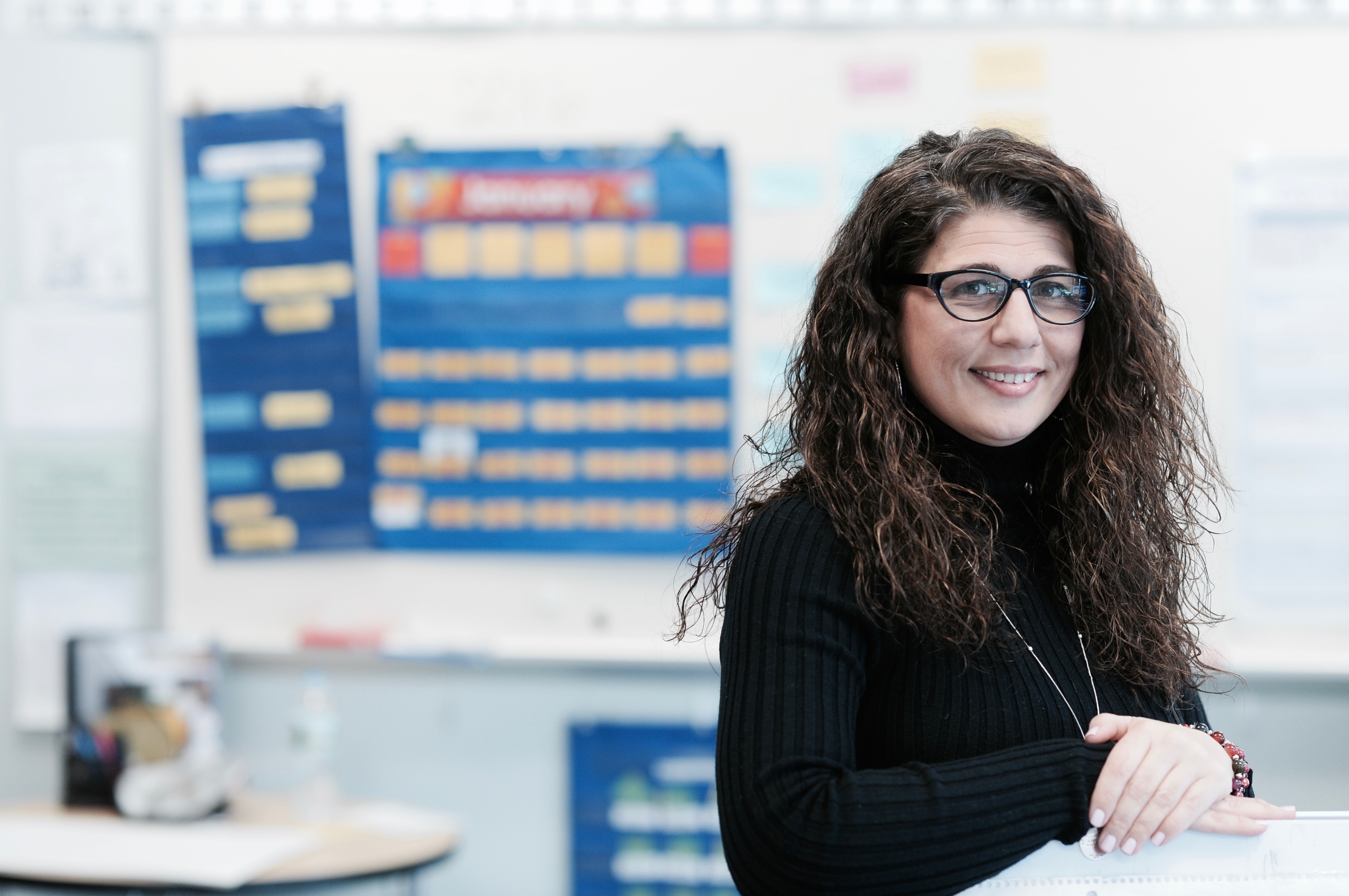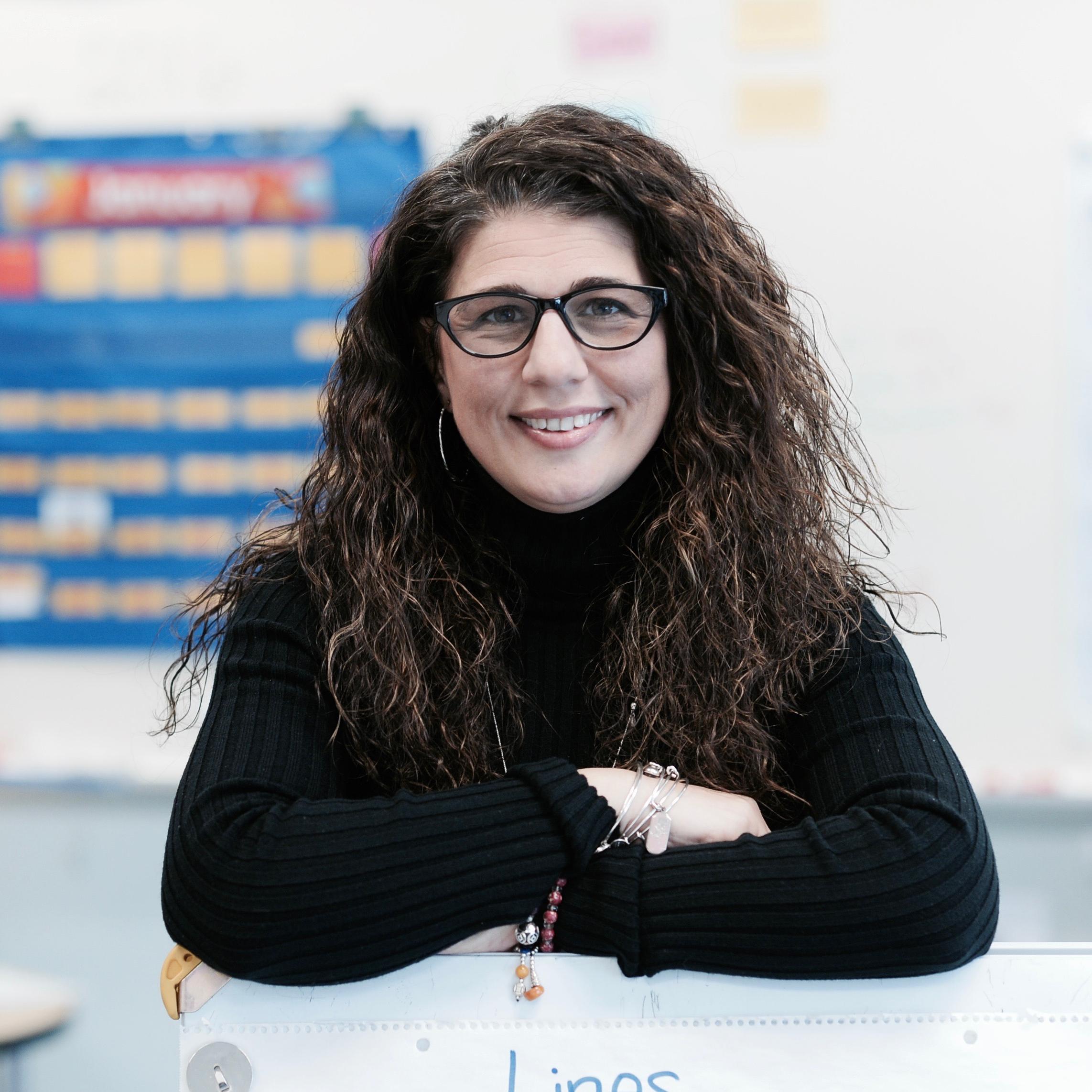Angela LaVeglia- A Teacher to Admire
At age 36, Angela accomplished her dream of becoming a special-ed teacher.

Angela Laveglia knew she wanted to be a teacher since kindergarten. “I was raised by my Italian-speaking grandmother, so I went into school knowing no English, and having no idea what the teacher was saying. But I do remember that she was so pleasant, and happy, and loving…and I don’t know how I learned, but I did.”
Since then, Angela made it her goal to become a teacher.
Years later, though, Angela had put college on hold to take care of her two children. “I met my husband, got married young, had kids, but there was always a piece of me still there that wanted to go back to school, that strived for something greater than a minimum-wage salary. I wanted to give my kids everything—but it wasn’t possible.” She decided to reignite her dream of becoming a teacher, and began looking into schools that catered towards a career in special education.
Then, coincidentally, Angela’s toddler was diagnosed with autism. “Again, college was put in the backseat…I needed to make sure my son’s academic and physical needs were getting taken care of, which was a whole education in itself.” Did her son’s special-needs affect her career plans to go into special-ed? Angela nods. “I did reconsider my career choice; I wasn’t sure how I could teach special-ed the whole day and then come home to it, too. But as much as it intimidated me a little bit, it made me want to do special-ed even more. I saw the positive effects it had on my son, and I saw the support the other students’ families and teachers gave us, and I realized just how much hope a teacher could bring into a situation. Being with my son also made me more familiar with the system: ABA, OT, ST, PT --- we did it all.”
Fast forward a few years, and Angela is now a successful fourth-grade special-ed teacher at PS 307 in Queens. Her classroom is a kaleidoscope of colors and messages: A carpet of the United States of America is on the floor, and posters about math and writing line the walls. Every morning, the OT-certified yoga teacher starts the day doing some relaxing yoga with her students.
“The kids are the reason I come here every day. I love being able to watch the light bulb go on, especially if the student has been struggling with the concept for a while. I love creating scaffolds, tools, and visual aids to help the student get there. It’s extremely rewarding.” Eleven of the twelve children require ESL services, “which adds a little bit of an extra challenge,” she says, “but it’s interesting to see the difference between the students that are struggling because of their special needs and those struggling because of the language barrier—like I did, when I was in kindergarten myself. So I’m able to diagnose it either way, and strategically work with them.”
The Para Finds NYSCAS
Angela was working as a para, at age 32, when she finally decided to try NYSCAS. “While researching, I realized that there was a college right here in Forest Hills. I had no idea! The location made it very comfortable for me because it was my community, just a few blocks away, so that in case there was a problem with my children, I didn’t have to worry about taking a long train or bus.”
College did take some adjusting to, Angela admits. “At first my kids didn’t really understand when I said I have to do my homework, or study… but as they got older it just became part of the routine. They understood that mom goes to school Tuesdays and Thursdays and she’s home by 9, early enough to come say good night and check homework. It wasn’t easy, but I was fortunate enough to have helpful family and friends around me.”
Meanwhile, Angela pushed through school, majoring in Psychology with a concentration on Education. “It was a real test of perseverance. I was sitting in math classes, and I was 32. I hadn’t seen algebra since freshman year of high school.” But when she finally reached senior year, she was holding down a steady 4.0 GPA. Because of her strong academic standing, her advisor offered her the chance to take six graduate credits that year—while still an undergrad. She accepted the offer immediately. “It was great. I got a headstart on my Master’s, so I was able to finish faster. I was already 36, you know? To get ready to do another three full years of time in graduate school was a big time constraint.” She finally graduated from NYSCAS – summa cum laude. “Putting on my cap and gown that day was an amazing feeling. I didn’t think I was going to reach that moment.”
While it was a no-brainer for Angela to continue on to Touro’s Graduate School of Education, she is quick to qualify that NYSCAS never pushed her into taking that route. “When they offered me the chance to take graduate courses while I was still an undergrad, they never asked me for any kind of commitment to finish with them. They just made it so smooth…I didn’t have to go out of my way at all, so it was almost like…why would I change?”
Pushing on to Graduate School
When she entered the Graduate School of Education’s Master’s program, she was happy to find that the program was “extremely comprehensive.” “Because I was a para, and because I was in the school environment, I was able to watch my education classes play out in a real-life classroom every day. It was incredible how I would learn something—a differentiation tool, or a concept—and then I’d be in class sitting with my one-on-one or small group, and doing it myself. It was such a hands-on way to learn.”
What Angela appreciated the most from the graduate program, however, was how flexible they were with student teaching. “At first I wondered why I had to do extra student teaching if I was already working as a para in the classroom every day! But once I got into the practicum and I started it, I realized how helpful it was to just focus on watching a teacher’s rapport with the students and dynamic in the classroom. Touro also made it very fair. Some programs said I had to quit my para job to do unpaid student teaching full time, which just wasn’t an option for me. Touro still counted my para hours towards the required hours.”
Reflecting on her experience at both NYSCAS and GSE as a whole, Angela pauses. “I like to say it was by the grace of G-d that everything fell into place… however, I know there are administrative people on the other end that are constantly putting things into place to make it work out. There’s a lot of strategy involved—more than I could ever begin to contemplate. At the time it seemed like all the classes revolved just around my schedule, but the more I talked to my peers, the more I realized it worked out for everyone in the class –who are all different tracks! All the convenience and flexibility is something I really appreciated about Touro.”
Now, the former para has her own para. “The para I have in my own classroom---She’s here doing student-teaching on her lunch. Just like I did. I always tell her, ‘Don’t go anywhere else besides Touro.”
And for now, she’s the happiest she could be as a special-ed teacher.
“They NEED me,” continues Angela. “There’s a need for people who get it, who know how to teach it, and for teachers who are compassionate, and who have a heart for these kids. Because, you know, in the city system, there’s not a whole lot of those people. So if I take myself out of the equation… it’s one less person.”
“When I look at these kids, I think of my son. They’re all somebody’s children, somebody’s babies. And they all have a place in the world. If I can at least get them to that road, to that place, then I did my job.”


